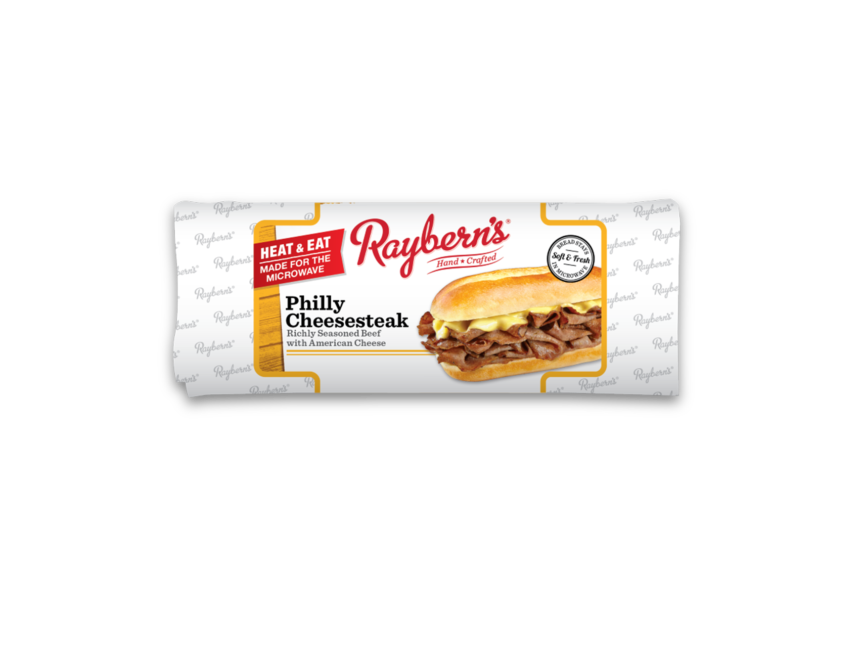Commissaries, central kitchens and other offsite facilities that supply value-added foods to grocery perimeter departments have ramped up their demand for heat-and-eat sandwiches from San Ramon, Calif.-based Raybern’s, said Doug Hall, the company’s marketing director.
“Commissary is a big part of our business, and it’s definitely trending up,” he said.
Going the commissary route is a popular option for retailers who want the quality of a Raybern’s but want to put their own stamp on their sandwich lineup. Raybern’s makes it easy, Hall said, for retailers to add their own store branding to products.
“It typically comes in with retailers who are looking to build their brand equity,” he said. “We make it easy to execute that.”
Raybern’s sandwiches can be marketed either frozen in center-store or refrigerated for heat-and-eat sales in grocery instore delis. In instore, sandwiches can be microwaved in the store for consumption there or taken home.
The company offers about eight different sandwich flavors, and varieties of pack size (single, two-count, eight-count, etc.) brings its total SKUs to about 25.
But during the pandemic, Hall said, Raybern’s found itself coming back to just a handful of tried-and-true options.
“Kind of a unique proposition came into play during COVID,” he said. “Labor was tight, we had a difficult time keeping up with demand, and we realized that we needed to focus on our core products.”
Those three core products —Philly cheese steak, roast beef and chicken bacon ranch —are not only Raybern’s biggest sellers, they’re also easier to make than some of its other products, which also proved crucial in the high demand/low labor situation the company found itself in.
Philly cheese steak is what Raybern’s is most known for. Its Philly is No. 1 in its category nationwide, Hall said.
That focus on its top three sandwiches has worked great during the pandemic, but once things return to some version of normal, Raybern’s will once again start expanding its sandwich product roster, Hall said.
Raybern’s will get back into breakfast sandwich production before 2021 is over, for instance. This time, however, the company will launch its lineup with a bit of a different spin.
“We wanted to offer something a little different, an indulgent treat for breakfast,” he said. “Waffle, egg and sausage, pancakes and maple biscuits.”
Also set for a late fall or early winter release is a meatball sandwich. And Raybern’s has about 15 other sandwiches currently under development.
“You’re going to see a lot of new sandwiches in the next six months.”
The automation and other labor-saving efficiencies Raybern’s created out of necessity during the pandemic will aid in that speedy rollout of new product.
When COVID hit, Raybern’s was expecting its fresh perimeter sales to explode. The opposite happened: frozen sales took off, as people wanted to limit their trips to the store and stock up on product with the longest shelf life possible.
This summer, however, pent-up demand for perimeter product has finally been released.
“Perimeter has exploded —it’s an inverse between perimeter and frozen,” Hall said. “And the perimeter is such an interesting space. Consumer demand has definitely changed there.”
Increasingly, people are seeing the instore deli as a place to find alternative meal solutions. People are looking to the perimeter as an alternative to fast food, for instance, which plays right into the hands of a Raybern’s.
The company often thinks of its target consumers in terms of two hypothetical consumers. “Pam” is a working mom with a somewhat higher income who needs something warm and substantial to feed her kids and herself while they’re hustling to and from after-school activities or in other on-the-go situations.
“Jackson,” another typical Raybern’s consumer, is on a budget and looking for something affordable to fill him up and that he can eat in the car going to or from work. He may pick up his Raybern’s at his local Walmart or Dollar General and heat it in a microwave oven instore.
Raybern’s is not one of the biggest sandwich brands on the market, so the company has had to work hard at getting its marketing messages out to customers and consumers, Hall said.
“It’s all about being in front of consumers,” he said.
Facebook and Instagram and frequent giveaways have been key components in that strategy, helping Raybern’s zero in on its core customers. Anytime any Raybern’s customer reaches out to the company, Hall sees it on his own phone. It’s a great way to keep his ear to the ground, and he’s frequently surprised.
“I never would have guessed that consumers would share their own recipes,” he said. “They’ll talk about adding their own onions and peppers to their Philly cheesesteaks, for example. It makes us think: maybe we should be adding it on for you instead.”
It must be paying off —in the past two or three years, Raybern’s has added about 30 new retailers, so many that the company is conscious of not growing so fast that it affects its ability to service its current customers.
It’s a good time to be a smaller brand in this space, Hall said.
“With smaller brands there’s a trust element,” he said. “That’s the biggest thing we’ve been able to decipher. There’s definitely a mistrust of big brands today.”

